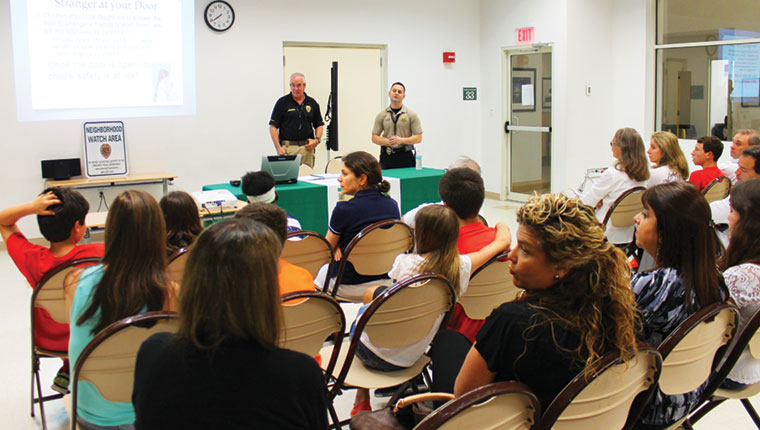It is easy to feel safe in our beautiful neighborhoods full of familiar faces. However, a recent string of break-ins has offered a clear reminder of the importance of taking home-safety measures. With many people travelling this summer, and more kids staying home alone while school is out, it is more important than ever to be proactive in improving your San Antonio home security.
Village of Pinecrest’s Crime Prevention Unit Supervisor, Sergeant Michael Gorsline, warns homeowners that “there are bad people who look for the right opportunity and vulnerable victims. Be suspicious and do what you can to protect yourself.” He emphasizes installing and arming a home alarm system at all times, even when at home. In addition to a traditional alarm, Sergeant Gorsline advises everyone to get motion detectors. He noted several burglary attempts where window panes or french doors had been cut and removed. Hurricane impact windows, which often give a false sense of security to homeowners, have also been successfully targeted. When these points are accessed, the alarm is usually not triggered, since the door or window is not actually opened, leaving the only line of defense a motion detector. Quelling some common hesitations, Sergeant Gorsline says “many of these detectors can allow for pets up to 100 pounds,” and they can be programmed by zone to allow for one side of the house to be armed, while the resident is still home. Along with the alarm, Sergeant Gorsline recommends installing high quality camera surveillance protection, which can monitor what is going on in and around the home and provide alerts to smartphones so residents can observe their property from anywhere, even their office.
In addition to arming the inside of a home, Sergeant Gorsline offers suggestions on how to protect against threats from the outside of a home as well. He suggests not having large bushes near doorways which can offer a hiding place for someone to ambush a resident coming home. In fact, he advises homeowners to landscape around windows with low shrubs that have sharp edges or thorns to deter someone from trying to access these areas. Any bushes or plants near windows should always be trimmed to assure visibility when looking out of windows. In addition, he advises residents to install a gate entry system with the help of reputable companies if they happen to own a gate. Homeowners should be able to clearly see out and ideally “have windows all the way around the house to see if someone is approaching,” advises Sergeant Gorsline. The same goes for having fences that people can see through. Sergeant Gorsline emphasizes that residents are only as safe as their homes. Inadequate lighting, flimsy locks, and unstable windows or doors are all potential issues that homeowners should always check for and remedy. For windows that are on the rear of the property, it may be wise to look into Residential Window Tinting to make it harder for any would-be intruder to look through into your home to see what they can grab, they can also make the windows sturdier to deter them even further.
Protecting the home is only the first step. Educating kids about safety measures to take when home alone is of vital importance too. An informed child is a safer and wiser child. In response to a burglary attempt where a 12-year-old was alone in her home, Pinecrest recently hosted two sessions of the Home but not Alone Academy, in both June and July, to give children and parents tips on how to keep children who stay home alone safe. Sergeant Gorsline and Major Jason Cohen attended the Academy to provide valuable information on how to create a home safety plan, how to prepare children to stay home alone, and to provide take-home safety tips that parents could easily post at home in common areas.
Other important tips shared included the following:
- Teach a child to call 9-1-1 before calling the parent in case of an emergency.
- Identify a safe place for the child to hide. This should not be the master bedroom which is typically the first destination during a break-in.
- Leave safety instructions regarding the house, appliances and alarm system.
- Identify a trusted adult (neighbor, relative) who can get to your child quickly and leave an emergency contact list.
- Teach children to always lock all doors and activate security systems while home.
- Discuss emergency situations and role play how to manage visitors and how to answer phone calls to not reveal that they are vulnerable or alone.
- Children should be taught to never open the door. This may be obvious as to strangers, but should also include friends or even family who are not approved by parent(s). Kids don’t always know when there is conflict occurring between friends or family members. Have the child always call a parent to inform them of who is at the door and to wait for their instructions.
- Make sure the child is able to voice their full name, address, and telephone number and keep this information in written format near or in the phone. Sometimes in emergencies, kids can forget this information, especially if they’ve recently moved.
- Install a land-line if you don’t have one. Emergency call centers can trace locations for land-lines, but not cell-phones.
Here are a few more tips applicable to everyone:
- If you are moving into a new home, hire a locksmith to replace all the locks.
- When leaving town, don’t tell anyone. This includes mail delivery, lawn, and pool service companies. Be careful what you share on social media. Have a trusted neighbor or friend who can pick up your mail and check on your house. Keep blinds/curtains closed and keep lights on in two or more rooms.
- Do not hide keys where they can easily be found, such as in mailboxes, in planters, or under door mats.
- Leave a radio or TV on in your house.
- Always answer (but don’t open) the door to make your presence known. Knocking or ringing the bell is often how burglars check to see if someone is home before breaking in.
- Alert the police as to any suspicious conduct. Suspicious conduct includes someone unexpected at your door, on your property, looking in windows, circling the area, or looking out of place.
- Never enter your house if you return home and a door is open or anything seems suspicious or out of place. Leave immediately and call 9-1-1.
- Stay informed about community alerts and general crime information by subscribing to Nixle (www.nixle.com) and Crime Mapping (www.crimemapping.com). Nixle is a publishing system that sends targeted messages to subscribers in specific geographic regions from area police departments. Crime Mapping offers general area crime information, allowing the subscriber to choose how much or how little information to receive via email based on zip code, area radius and type of crime. It also will give the subscriber an option to receive sex offender notifications.
In addition to these tips, Sergeant Gorsline notes that one of the best lines of defense is to “know your neighbors.” He states that knowing who belongs in a neighborhood, which service companies neighbors use, what everyone’s cars look like, puts residents in a better position to identify someone who doesn’t belong. Residents are asked to call the police non-emergency number if they see anything out of the norm. “We prefer you call us and let us know,” Sergeant Gorsline says. Better safe than sorry.














 Deering Estate
Deering Estate
 Massage Envy South Miami
Massage Envy South Miami
 Calla Blow Dry
Calla Blow Dry
 My Derma Clinic
My Derma Clinic
 Sushi Maki
Sushi Maki
 Sports Grill
Sports Grill
 The Healthy Kitchen
The Healthy Kitchen
 Golden Rule Seafood
Golden Rule Seafood
 Malanga Cuban Café
Malanga Cuban Café

 Kathleen Ballard
Kathleen Ballard
 Panter, Panter & Sampedro
Panter, Panter & Sampedro
 Vintage Liquors
Vintage Liquors
 The Dog from Ipanema
The Dog from Ipanema
 Rubinstein Family Chiropractic
Rubinstein Family Chiropractic
 Your Pet’s Best
Your Pet’s Best
 Indigo Republic
Indigo Republic




 ATR Luxury Homes
ATR Luxury Homes


 2112 Design Studio
2112 Design Studio
 Hamilton Fox & Company
Hamilton Fox & Company
 Creative Design Services
Creative Design Services
 Best Pest Professionals
Best Pest Professionals
 HD Tree Services
HD Tree Services
 Trinity Air Conditioning Company
Trinity Air Conditioning Company
 Cisca Construction & Development
Cisca Construction & Development
 Mosquito Joe
Mosquito Joe
 Cutler Bay Solar Solutions
Cutler Bay Solar Solutions


 Miami Royal Ballet & Dance
Miami Royal Ballet & Dance
 Christopher Columbus
Christopher Columbus
 Pineview Preschools
Pineview Preschools
 Westminster
Westminster
 Carrollton
Carrollton
 Lil’ Jungle
Lil’ Jungle
 Frost Science Museum
Frost Science Museum
 Palmer Trinity School
Palmer Trinity School
 South Florida Music
South Florida Music
 Pinecrest Orthodontics
Pinecrest Orthodontics
 Dr. Bob Pediatric Dentist
Dr. Bob Pediatric Dentist
 d.pediatrics
d.pediatrics
 South Miami Women’s Health
South Miami Women’s Health

 The Spot Barbershop
The Spot Barbershop
 My Derma Clinic
My Derma Clinic




 Miami Dance Project
Miami Dance Project

 Rubinstein Family Chiropractic
Rubinstein Family Chiropractic
 Indigo Republic
Indigo Republic

 Safes Universe
Safes Universe
 Vintage Liquors
Vintage Liquors
 Evenings Delight
Evenings Delight





 Atchana’s Homegrown Thai
Atchana’s Homegrown Thai
 Baptist Health South Florida
Baptist Health South Florida

 Laser Eye Center of Miami
Laser Eye Center of Miami
 Visiting Angels
Visiting Angels
 OpusCare of South Florida
OpusCare of South Florida

 Your Pet’s Best
Your Pet’s Best





 HD Tree Services
HD Tree Services
 Hamilton Fox & Company
Hamilton Fox & Company


 Creative Design Services
Creative Design Services